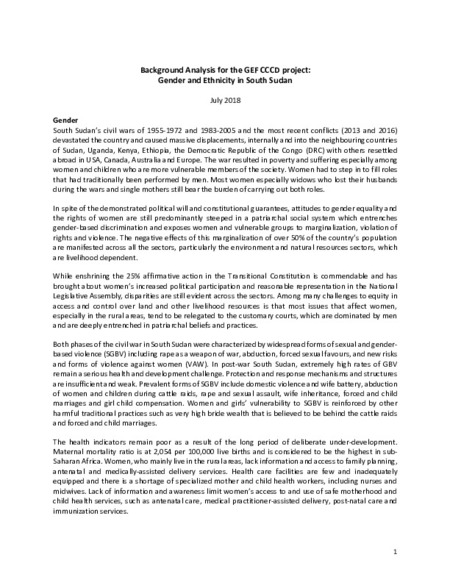Background Analysis for the GEF CCCD Project: Gender and Ethnicity in South Sudan
| dc.contributor | Africa Office | en_US |
| dc.contributor.author | United Nations Environment Programme | en_US |
| dc.coverage.spatial | South Sudan | en_US |
| dc.date.accessioned | 2022-08-01T04:08:06Z | |
| dc.date.available | 2022-08-01T04:08:06Z | |
| dc.date.issued | 2018 | |
| dc.identifier.uri | https://wedocs.unep.org/20.500.11822/40424 | |
| dc.description | South Sudan’s civil wars of 1955-1972 and 1983-2005 and the most recent conflicts (2013 and 2016) devastated the country and caused massive displacements, internally and into the neighbouring countries of Sudan, Uganda, Kenya, Ethiopia, the Democratic Republic of the Congo (DRC) with others resettled abroad in USA, Canada, Australia and Europe. The war resulted in poverty and suffering especially among women and children who are more vulnerable members of the society. Women had to step in to fill roles that had traditionally been performed by men. Most women especially widows who lost their husbands during the wars and single mothers still bear the burden of carrying out both roles. | en_US |
| dc.format | Text | en_US |
| dc.language | English | en_US |
| dc.rights | Public | en_US |
| dc.subject | gender | en_US |
| dc.subject | gender equality | en_US |
| dc.subject | ethnicity | en_US |
| dc.subject | South Sudan | en_US |
| dc.title | Background Analysis for the GEF CCCD Project: Gender and Ethnicity in South Sudan | en_US |
| wd.identifier.sdg | SDG 5 - Gender Equality | en_US |


